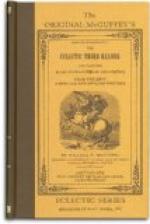By custom and under sanction of law certain studies are pursued in the common schools of every state. Spelling, reading, writing, arithmetic, geography, history, grammar, civics and physiology are the subjects usually taught. The school authorities select the textbooks which shall be used in each subject. The readers are the only texts used in all schools affording opportunity for distinct ethical teaching. The history of our country should give ideas of patriotism; the civics should contain the primary notions of government; the physiologies should instruct the pupils in the laws of health; but the reader should cover the whole field of morals and manners and in language that will impress their teaching indelibly upon the mind of every pupil. While the chief aim of the school readers must be to teach the child to apprehend thought from the printed page and convey this thought to the attentive listener with precision, these efforts should be exerted upon thoughts that have permanent value. No other texts used in the school room bear directly and positively upon the formation of character in the pupils. The school readers are the proper and indispensable texts for teaching true patriotism, integrity, honesty, industry, temperance, courage, politeness, and all other moral and intellectual virtues. In these books every lesson should have a distinct purpose in view, and the final aim should be to establish in the pupils high moral principles which are at the foundation of character.
[Formers of Character]
The literature of the English language is rich in material suited to this intent; no other language is better endowed. This material is fresh to every pupil, no matter how familiar it may be to teacher or parent. Although some of it has been in print for three centuries, it is true and beautiful today.
President Eliot has said, “When we teach a child to read, our primary aim is not to enable it to decipher a way-bill or a receipt, but to kindle its imagination, enlarge its vision and open for it the avenues of knowledge.” Knowledge gives power, which may be exerted for good or for evil. Character gives direction to power. Power is the engine which may force the steamer through the water, character is the helm which renders the power serviceable for good.
Readers which have been recognized as formers of good habits of action, thought, and speech for three-quarters of a century, which have taught a sound morality to millions of children without giving offense to the most violent sectarian, which have opened the doors of pure literature to all their users, are surely worthy of study as to their origin, their successive changes, and their subsequent career.
The story of these readers is told in the specimens of the several editions, in the long treasured and time-worn contracts, in the books of accounts kept by the successive publishers, and in the traditions which have been passed down from white haired men who gossiped of the early days in the schoolbook business. Valuable information has also been furnished by descendants of the McGuffey family, and by the educational institutions with which each of the authors of the readers was connected.




